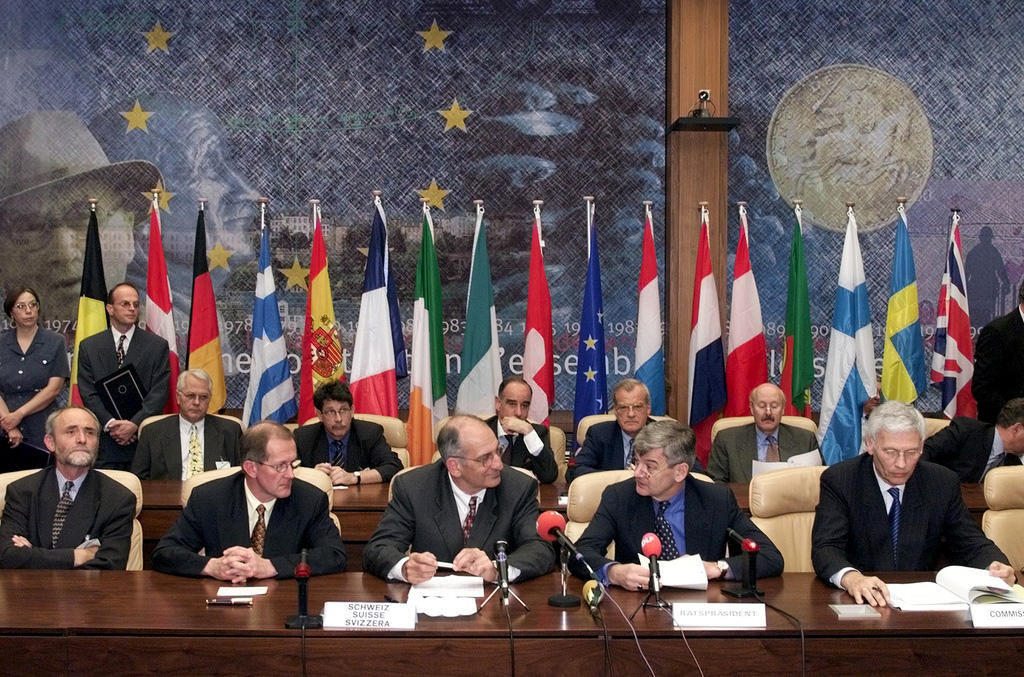Does Switzerland really benefit from EU bilateral accords?

As Switzerland moves closer to implementing the initiative “against mass immigration”, the country’s politicians, economists and business leaders have clashed in a fierce debate over the pros and cons of the bilateral agreements with the European Union.
The free-market camp says the accords are crucial for maintaining strength and growth in the Swiss economy.
“Anyone downplaying the importance of the bilateral accords is actively playing with fire,” warned Economics Minister Johann Schneider-Ammann last year.
But isolationists, led by the conservative right Swiss People’s Party which was behind the immigration initiative, argue the country will be no worse off without the accords.
“Switzerland will not fall apart without these so-called bilateral agreements,” argued People’s Party strongman Christoph Blocher recently on his private television channel, Teleblocher.
Worse off
The first series of seven EU bilateral accords (known as Bilaterals I) was adopted in 2002 and covered the free movement of people, technical barriers to trade, public markets, agriculture, land and air transport, and research. A second series of accords was adopted in 2004.
Models conducted by the State Secretariat for Economic Affairs (SECO), which reports to Schneider-Ammann, estimate that terminating the Bilaterals I would weigh down Switzerland’s gross domestic product (GDP) by between CHF460 billion ($480 million) and CHF630 billion over the next 20 years. In other words, it would cost the Swiss economy the equivalent of almost a year’s income at the current rate, according to the SECO report, which relied on two studies from research institutes BAKBASEL and Ecoplan.
Taken in isolation, cancelling the agreement for the free movement of people and returning to immigration quotas, as advocated by the People’s Party, would lead to a 3%-4.5% reduction in GDP by 2035. The impact on the economy as a whole of terminating the remaining six Bilaterals I accords would be less dramatic, but the sectors concerned, particularly research, “would be heavily impacted”, SECO warns.
A separate study by free-market think tank Avenir Suisse argues that large businesses as well as small and medium-sized enterprises (SMEs), consumers and the middle class have all been the beneficiaries of bilateral agreements with the EU.
For its part, the Swiss Business Federation, economiesuisse, has calculated that without the bilateral agreements, economic growth per resident would have been 5.7% less between 2002 and 2014. Put simply, every Swiss resident today would earn an average CHF4,400 less per year.
Variable results
It is no coincidence that there is a sudden proliferation of studies demonstrating the benefits of the bilateral agreements with the EU.
Since 50.3% of Swiss voters rejected joining the European Economic Area (EEA) in 1992, the portion of the population sceptical of the government’s path of negotiating bilateral agreements has continued to grow. Those in favour of bilateral agreements are still in the majority, but their numbers have declined by 12 points in less than a year, according to polls carried out by gfs.bern.
And so on the eve of a likely vote that will conclude the implementation phase of the initiative against mass immigration, the nervousness of both the authorities and major economic organisations is palpable.
The isolationists have been quick to counter-attack. Florian Schwab, an economist and journalist at Weltwoche, a weekly news magazine that aligns itself with the ideas of the People’s Party, analysed previous studies on the subject. He concluded there is no scientific agreement that there has been a statistically significant positive effect as a result of the accords.
Effects of terminating Bilaterals I
On April 21, economic forecasters BAKBasel said terminating Bilaterals I posed the greatest risk to the Swiss economy, with all cantons – and especially border cantons – potentially affected.
According to economic models, growth would be a quarter less than with the agreements. Also, from 2030, individuals could be almost CHF3,500 worse off a year.
If the agreements were terminated, new negotiations would begin, but the longer these went on, the greater the damage to GDP, BAKBasel said. It calculated that a realistic three-year negotiation period could cause a GDP loss of around CHF50 billion.
“These accords are not as existential for the Swiss economy as people say. They could also be offset by other economic policy measures,” Schwab argues.
Cenni Najy, a researcher with Swiss foreign policy think tank foraus, notes: “These studies come at a crucial moment for the future of the bilateral path. It is therefore unsurprising that the results vary greatly according to the methodology employed and the point of view of the authors.”
Which growth model?
One thing is certain: the wide support for the advantages of the bilateral path during the first vote on May 21, 2000 – the People’s Party did not actively support the referendum – is slowly crumbling. This is down to a growing euroscepticism within the population and the negative impacts of immigration and economic growth that was higher than predicted or badly anticipated by the authorities: wage dumping, rising real estate prices, gridlocked roads and overcrowded trains.
“Most of the studies are happy enough to coldly analyse the positive impact of the bilateral agreements on GDP or the flexibility of the labour market,” says Najy. “The negative effects, like the pressure in recent years on infrastructure due to mass immigration or wage dumping, are paid little attention.”
By narrowly accepting the initiative “against mass immigration”, a majority of Swiss decided to send a signal to the authorities to force them to take their concerns into account, Najy says.
“But again today, the political class, particularly at the cantonal level, continues to underestimate the problems,” he says.
“Since February 9, 2014, they’ve been talking about immigration quotas or the national preference, but the central question of the desired growth model has never been raised. If we want to limit immigration, we have to first reduce the attractiveness of our country. But today, many cantons continue to practise aggressive taxation policies with the aim of attracting foreign multinationals and the expatriate personnel that goes with them.”
Potential fallout
Jacques Lévy, professor of geographic policy at the Swiss Federal Institute of Technology in Lausanne (EPFL), also expresses reservations about the economic studies that try to determine to the last franc the effects of a policy of which the global impacts are difficult to quantify. However, he warns against the temptation to withdraw, a move which he says has never benefited any nation.
“Since the beginning of the 20th century, all the examples of closing a country or a region off from the rest of the world have resulted in serious development problems. This is even truer today as we live in a world in a state of flux,” he says.
At the initiation of former cabinet minister Pascal Couchepin, a number of Swiss big names are also warning of the wider effects of voiding the bilateral accords.
“The political problem is not mentioned [in these studies]. A kind of economic war with the European Union would be catastrophic for investment and morale in Switzerland,” Couchepin said during a television interview on Swiss public television, SRF. Especially because, despite the diversification of trade, the EU remains Switzerland’s largest trading partner.
However, opponents of the bilateral agreements argue that such a commercial war is unlikely. They say Switzerland imports more from the EU than it exports and so trade facilitation principally favours the European nations.
Translated from French by Sophie Douez

In compliance with the JTI standards
More: SWI swissinfo.ch certified by the Journalism Trust Initiative














You can find an overview of ongoing debates with our journalists here . Please join us!
If you want to start a conversation about a topic raised in this article or want to report factual errors, email us at english@swissinfo.ch.